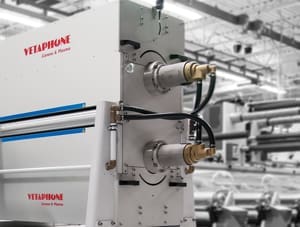CEO Frank Eisby explains how his company has moved the game on
Industry 4.0 is the topic on many lips right now, and to some it has been over-hyped, but if the understanding of the term is a ‘smart factory’, then this has largely been achieved. The principle of Industry 4.0 is based on the premise that by connecting machines, work pieces and systems, businesses are creating intelligent networks along the entire value chain that can control each other autonomously.
Over the Internet of Things (IoT), Vetaphone’s corona and plasma systems communicate and cooperate with main systems and with humans in real time. Our ‘intelligent’ corona and plasma systems monitor the physical processes, such as all data from the generators, status of the stations, and actual sensor indications to create a virtual copy of the physical setup, and then make decentralised decisions. Improvements in self-optimisation, self-configuration, self-diagnosis with understanding, and intelligent support of workers in their increasingly complex environments, are also included.
Our systems can predict failures and trigger maintenance processes autonomously or provide self-organised logistics that react to unexpected changes in production and thereby require attention at the best possible time for just-in-time maintenance to offer near-zero downtime.
Vetaphone offers IoT for Industry 4.0 in nine different industrial protocols. In an Industry 4.0 scenario, boundaries of individual factories will most likely no longer exist. Instead, interconnection of multiple factories, or even geographical regions, will enable production of end products that are completely identical. This embraces the ability to make decisions independently and perform tasks autonomously. Only exceptions, interference, or conflicting goals, will delegate tasks to a higher level.
The result is a significantly positive impact on the company value chain – and at Vetaphone, we are there already – we call it Industry 4.0 Gen 2.

